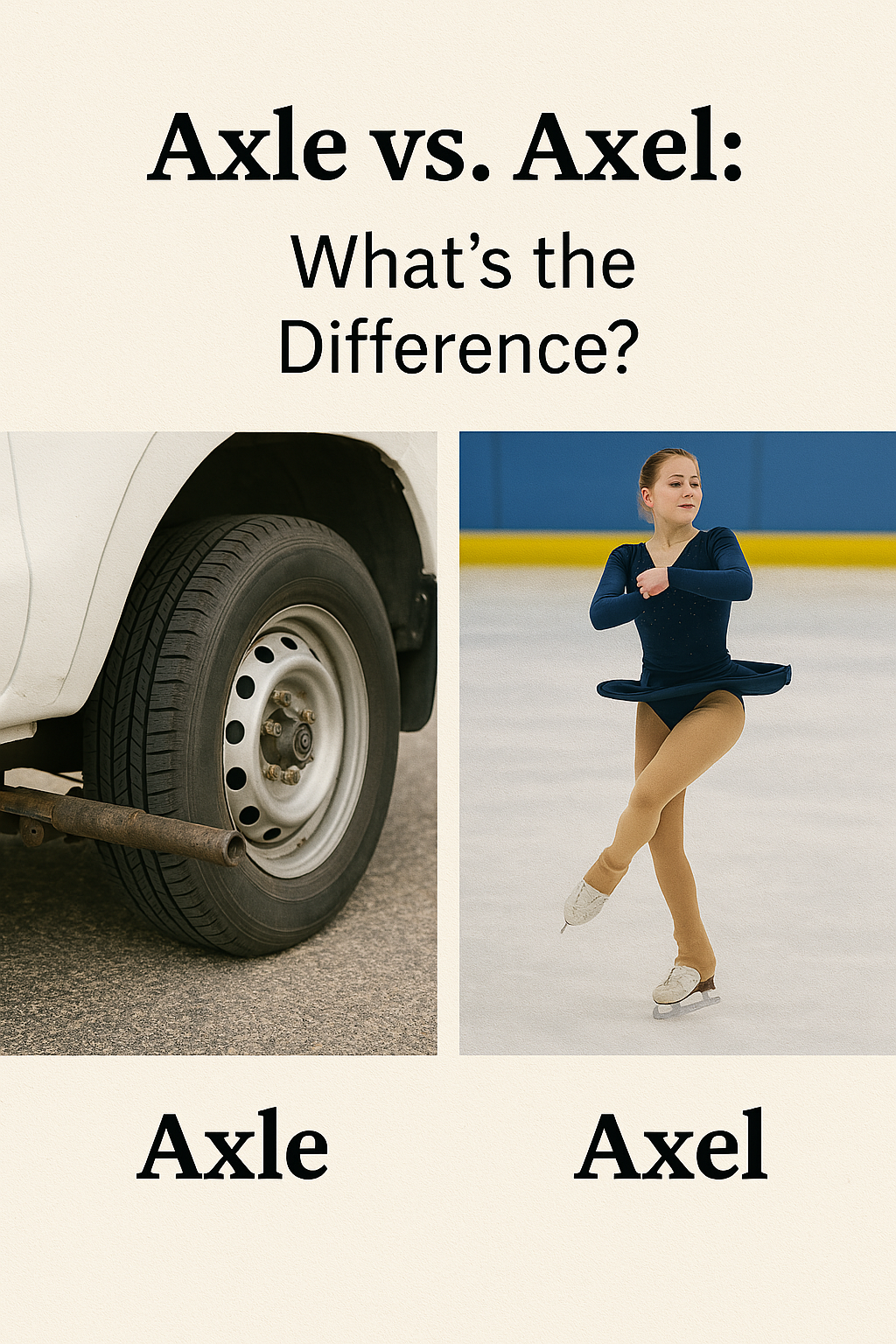The words axle and axel sound the same, but they mean completely different things. One belongs to the world of vehicles, while the other is a term from figure skating. If you’ve ever been confused about which is which, you’re not alone. Let’s break down the key differences, their origins, and how to use them correctly.
Heterographs Difference: Axle vs. Axel
English has many words that sound alike but have different meanings—these are called heterographs. The words axle and axel fall into this category. While their pronunciation is identical, their definitions couldn’t be more different:
- Axle refers to a mechanical component in vehicles.
- Axel is a famous figure skating jump.
These homophones create confusion, but understanding their contexts makes them easy to remember.
Axle Definition: A Vehicle Shaft
An axle is a crucial car component that connects and supports the vehicle’s wheels. It plays a vital role in weight distribution and movement facilitation.
Read More About This Article: Traveler vs. Traveller: Which Spelling Is Right?
Functions of an Axle:
- Supports the vehicle’s weight
- Allows the wheels to rotate
- Transfers power from the engine to the wheels
- Maintains wheel alignment
Types of Axles
| Type | Function |
|---|---|
| Live Axle | Rotates with the wheels and transmits power |
| Dead Axle | Does not rotate; only supports weight |
| Tandem Axle | Two axles placed close together to bear heavy loads |
Axel Figure Skating: A Difficult Jump
In figure skating, an axel is one of the most challenging jumps. Named after Axel Paulsen, this jump is unique because it includes an extra half rotation compared to other jumps.
Features of the Axel Jump:
- Skater takes off from the forward outside edge
- Performs a 1.5, 2.5, or 3.5 air rotations
- Lands on the opposite foot
Levels of Axel Jumps:
| Axel Type | Number of Rotations |
|---|---|
| Single Axel | 1.5 |
| Double Axel | 2.5 |
| Triple Axel | 3.5 |
This jump is a highlight of skating competitions, often earning high scores due to its difficulty.
The Vehicle’s Wheels and Axle Connection
An axle is essential for the movement of a vehicle’s wheels. Without it, wheels wouldn’t rotate, and the car wouldn’t move.
How an Axle Connects to Wheels:
- The wheels attach to the ends of the axle.
- The axle transfers power from the engine to the wheels.
- Proper alignment ensures smooth tire rotation and vehicle stability.
Axel Paulsen: The Man Behind the Jump
The axel jump was first performed by Axel Paulsen, a Norwegian skater, in 1882. He was known for pushing the limits of figure skating and creating a jump that would become a staple in the sport.
Quick Facts About Axel Paulsen:
- Born: 1855, Norway
- Famous For: Creating the axel jump
- Legacy: Revolutionized figure skating techniques
The Invention of the Axle in Transportation
The invention of the axle transformed transportation. It allowed for:
- Faster, more stable vehicles
- Better weight distribution
- Increased efficiency in movement
From horse-drawn carriages to modern automobiles, axles have remained a key mechanical advancement.
Axel Jump: A Skating Skill Requiring Precision
Mastering an axel jump requires perfect timing, strength, and balance. Skaters spend years perfecting the skill before landing a double or triple axel in competitions.
How Skaters Train for an Axel:
- Strength Training: Building leg power for takeoff
- Balance Drills: Improving air rotation control
- Jump Simulation: Practicing rotations off the ice
Axle in Transportation: A Key to Movement
Without an axle, modern vehicles wouldn’t function. Axles ensure:
- Power is transmitted to the wheels
- The vehicle moves smoothly
- Heavy loads can be supported
This makes them a fundamental component of every car, truck, and bus on the road today.
Similar Sounds, Different Meanings
Even though axle and axel sound alike, their meanings are worlds apart. Here’s a quick recap:
| Word | Meaning |
|---|---|
| Axle | A vehicle’s rotating shaft |
| Axel | A figure skating jump |
English Heterographs: More Examples
Many heterographs create similar confusion. Here are a few more examples:
- Flour (used in baking) vs. Flower (a plant)
- Principal (head of a school) vs. Principle (a rule or belief)
- Stationary (not moving) vs. Stationery (writing materials)
The Role of Rotation in Air: Axle vs. Axel
Both words relate to rotation, but in completely different contexts:
- An axle rotates mechanically to move vehicles.
- An axel requires aerial rotation in figure skating.
Final Thoughts
Understanding the difference between axle and axel helps you avoid confusion. Whether you’re talking about a car’s mechanical shaft or an ice skater’s famous jump, using the correct term ensures clear communication. Next time you see a figure skater land a perfect axel, you’ll know it has nothing to do with a car’s axle!
